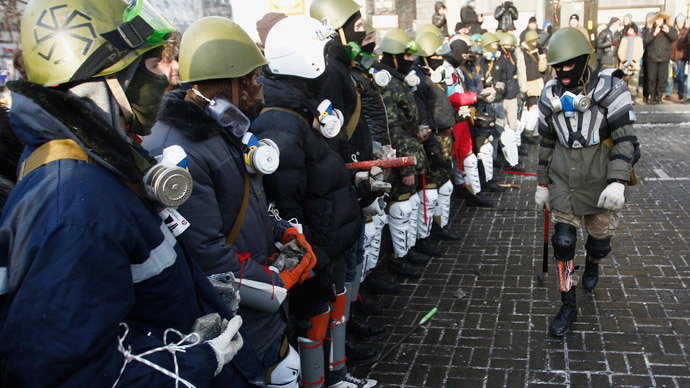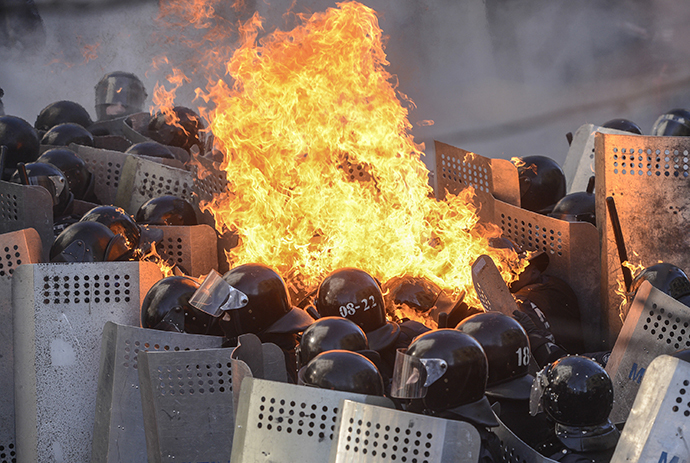The need to combat modern fascism

Every year on 8 and 9 May Europe celebrates the liberation from fascism.
It is a day to commemorate those who died during the Second World War, but also, it is a day to recall that our generations must do what we can to prevent a new resurgence of the Nazi ideology (let alone practice!) that poisoned our continent and led to unheard-of atrocities.
Unfortunately, neo-Nazism and neo-fascism are again finding their way into public life. Russia has been raising this issue for many years, in particular with respect to the Baltic states, notably Latvia and Estonia. That their countrymen who fought against the Soviet Union and anti-Hitlerite coalition on the Nazi side are “heroes” of a “national liberation movement”, has become the mainstream idea in those countries. Monuments are erected and public rallies are held dedicated to those fighters, including members of the SS, an organisation proclaimed criminal in its entirety by the Nuremberg Tribunal.
Crimes committed by the Nazis, including those from Latvia and Estonia, against the Jewish and Slavic populations, are hushed up. And, in parallel, monuments to the Red Army soldiers are being demolished or removed. The European Union continues to turn a blind eye to these manifestations that are qualified as a matter of “freedom of expression”. Does the same go for anti-Semitism?
Ironically, other parts of the world seem to remember European history better and do understand the problem. This realisation has led the UN General Assembly to adopt, on annual basis, a resolution on Combating glorification of Nazism. It is worth mentioning that EU countries abstained from voting, while the United States and Canada were among those who voted against the draft, something that is extremely perplexing.

Unfortunately, the calls by the General Assembly have not yet led to this worrying trend subsiding. Most recently, we have been seeing an unprecedented rise of the neo-fascist movement in Ukraine. The anti-corruption and pro-democracy movement uprising in that country was swiftly hijacked by armed national-radical extremists who do not hide their anti-Semitic and neo-Nazi credentials. Suffice it to mention that almost a third of seats in the current government in Kiev are occupied by representatives of the Svoboda (“Freedom”) party, an organisation that the European Parliament has declared racist and xenophobic. And the armed groups behind the Ukrainian “revolution” are fighters of the so-called “Right Sector” that has brought together all kinds of ideological followers of the Third Reich and its nationalist collaborators.
Instead of suppressing these activists, the interim authorities seem to be relying on them in their divisive politics, including with respect to the south-eastern regions, whose concerns they wouldn’t address. Most worryingly, it is these extremists who are used as the main source of recruits for the newly formed “National Guard”, which means replacing traditional national security forces by armed formations based on partisan and political allegiances. The fear of the Russian-speaking population in the East in the face of their punitive operations is easy to understand. People don’t want to live in a country where the head of the government, apparently controlled by far-right elements, uses the Victory Day to praise the “heroism” of Ukrainian Nazi collaborators on an equal footing with Red Army veterans, as Mr Yatsenyuk did on 9 May, where nationalists sing the national anthem while people are burnt alive, as took place in Odessa.
Russia reiterates its call upon all European partners, governments and peoples alike: don’t let yourselves be drawn into an illusion that neo-fascism can be used safely for reaching immediate political objectives. There are plenty of problems to be addressed across the continent related to ethnic and national identities, the role of religious communities, minority rights etc., and connivance of the rise of far-right extremism in some countries can only complicate the search for solutions in other ones.
The statements, views and opinions expressed in this column are solely those of the author and do not necessarily represent those of RT.
The statements, views and opinions expressed in this column are solely those of the author and do not necessarily represent those of RT.













